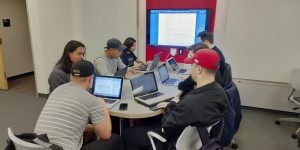At UBC (and Michigan, Queen's, Manitoba) I've taught:
- Undergraduate political science quantitative methods.
- Graduate political science quantitative methods.
- Public opinion and elections.
- Canadian politics.
Until 2018 I've taught these in a more-or-less standard way. That is: readings, mostly me talking at students, some writing activities, some discussion, and often tests and a final exam.
In 2012 colleagues and I (Andrew Owen, Grace Lore) redesigned POLI380 to be more active, skills-oriented, and less lecture-y. By the standard measures (whether students thought the instructor was "effective") this transformation has been a mixed success.
I myself replaced lectures with powerpoint completely. Instead, I have interactive questions to which students respond through a Classroom Response System (Learning Catalytics, TopHat, etc.). I would never go back to lecturing. I'm convinced that it produces minimal lasting, deep learning and is basically a waste of everyone's time. I think it's pre-printing press technology and we've just never got past the idea that a real student experience is listening to an expert.
I'll never do anything even close to the normal course design again. In 2018, I went on two teaching adventures. The most radical was to have 48 students co-produce a website to be a public resource for a referendum in the province of BC. Here's the story: POLI308D 2018 & 2019: A radical course design to build the UVoteBC.ca and the Elect2019.ca websites. Then in 2020 and 2021 I kept it going but started using Notion; here's the story on that.
The other adventure was to do a 4th year seminar as a workshop in rapid-fire quantitative research. The entire reading list was three articles, one per month. Students replicated the research design in the articles, but on a different question with different data that they found and analyzed.

Learning Significance